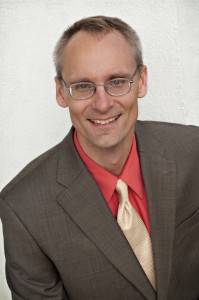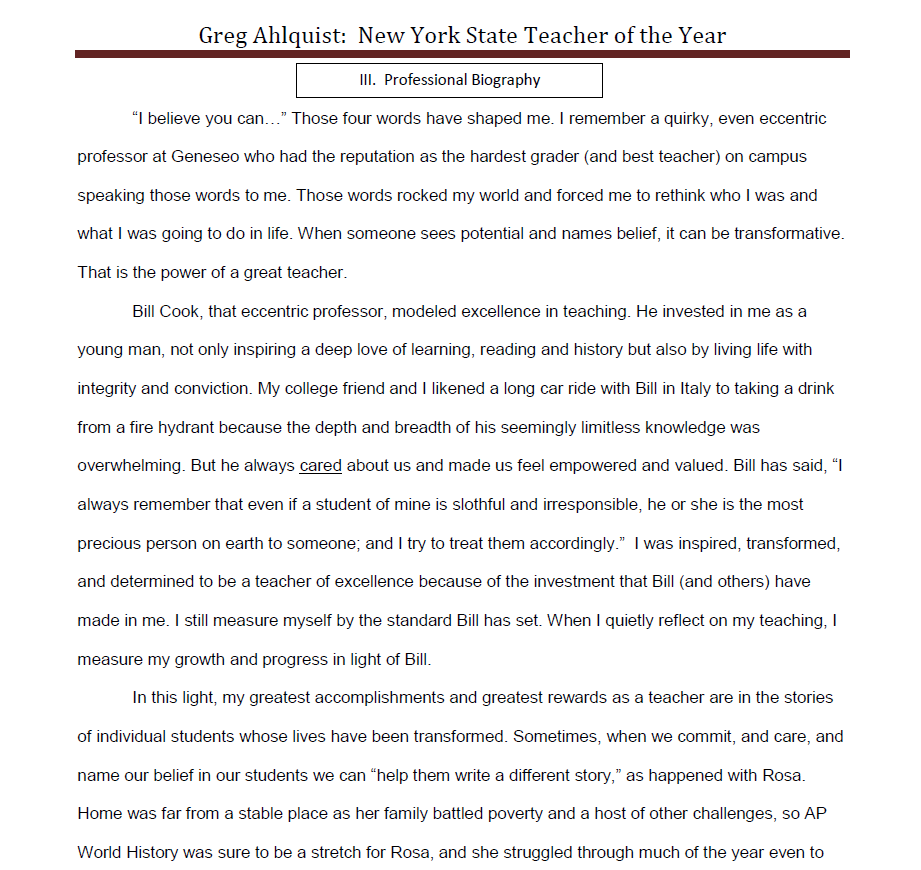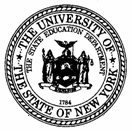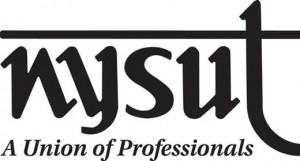
![]()
 Before becoming the 2013 New York State Teacher of the Year, Greg Ahlquist thrived on the opposite side of the classroom. Ahlquist graduated from Webster Thomas High School, located outside Rochester, NY, and SUNY Geneseo, the two schools where he currently teaches. During his time at SUNY Geneseo, Ahlquist majored in History with a minor in Medieval Studies, graduating summa cum laude in 1995. He went on to earn his Master’s Degree in History from Syracuse University and receive his teacher certification from SUNY Brockport.
Before becoming the 2013 New York State Teacher of the Year, Greg Ahlquist thrived on the opposite side of the classroom. Ahlquist graduated from Webster Thomas High School, located outside Rochester, NY, and SUNY Geneseo, the two schools where he currently teaches. During his time at SUNY Geneseo, Ahlquist majored in History with a minor in Medieval Studies, graduating summa cum laude in 1995. He went on to earn his Master’s Degree in History from Syracuse University and receive his teacher certification from SUNY Brockport.
Ahlquist says “teaching is the measure of my gratitude,” and he proves that with his praised career and firm belief in the incredible potential of all his students. For the past fourteen years, Ahlquist has been an adjunct lecturer at SUNY Geneseo, mainly teaching humanities with some courses in the history and Latin departments. As for his work at Webster Thomas High School, where he has been teaching for the past twelve years, he currently instructs AP World History to sophomores and AP European History to mostly senior students. He also received the district’s Oak Tree Award, an annual award which recognizes teacher excellence in Webster Central Schools at both the elementary and secondary levels.
It is without a doubt that Gregory Ahlquist exemplifies the high standards and practices recognized by the New York State’s 43rd Teacher of the Year award. The State University of New York congratulates him on this honor and achievement.
 | [iframe src=”http://eplayer.clipsyndicate.com/embed/iframe?aspect_ratio=3×2&auto_next=1&auto_start=0&page_count=5&pf_id=9210&pl_id=21150&rel=3&show_title=0&tags=5709&va_id=3794194&volume=8&windows=1″ width=”100%” height=”330″] |
![]()

1. Do you have any goals that you’d like to accomplish over the next year as you represent NY’s teachers?
Everyone recognizes that it is a challenging context and time to be a teacher. I think part of my goal is in the midst of the challenges and even in the critique that we face and education faces. My goal is focus on what is important and it also is an opportunity for me to call all educators and stakeholders in education back to focus on learning and the students.
My message that I am kind of carrying across the state is entitled The Transformative Power of Belief. My goal is to refocus, inspire and challenge all educational stakeholders: What we believe about students and learning impact what we do; and what we believe about students impacts what we do.
I have been greatly influenced by Carol Dweck of Stanford University. Her research is on mindset—two differences that everyone has in a verity of things. These are the growth and fix mind sets. The growth mind set says that intelligence grows over time. The fix mindset holds that you are who you are and you can’t change that. Her work is applicable to not only education, but also all of life.
2. Back when you made the decision to attend SUNY Geneseo, what drew you to that school specifically?
Geneseo already had a reputation “public ivy league”. The academic excellence reputation caught my attention and I knew I was going to apply. I recognized the cost-effective tuition—stacking it up next to any private college—better education and less cost. And then affordability; you don’t want your options to be limited by debt and an unbearable debt after you leave undergraduate school. I recognized that it was the right fit for me culturally and I saw after visiting the campus that I was going to have personal attention and education. Huge Advantage to SUNY.

3. What was your experience like as a student at Geneseo?
I had a world class education by world class professors at Geneseo. It may sound like a hyperbole but it’s really not. I had 3 professors that profoundly influenced my learning and how I was going to be a student and ultimately a teacher—2 English and 1 history. Dr. Bill Cook was my mentor in the history department. He made medieval history come alive in a way that inspired me to learn. I learned practical skills of writing, research, and wrestling with primary sources that enabled me to enter into history and understand their worldview. Understanding other people and other worldviews is a practical and valuable skill. Dr. Cook challenged me in ways to innumerate.
4. How did your Education at SUNY Geneseo help prepare you for life and your career?
I learned how to teach by seeing great teachers. You learn more by watching great teachers teach and the personal investment made by those teachers. That kind of personal attention and investment does not happen at a private school where you have 20,000 students, unlike and unique to SUNY—specifically Geneseo. That personal investment modeled good teaching. It wasn’t just the academic content, but also investing in me as a young man; seeing how those teachers lived their lives and how it matched up with what they taught in the classroom.
5. Who were your major influences or mentors in your life and why?
There were a number of teachers at Webster who spurred on my desire to learn and to grow. Webster teachers – great thing so many were able to speak into my situation as a student and contributed into me as a student. Rob Dematius – math teacher and basketball coach Bill O’Rorek both invested in me as a student.
Currently, I work with some of the best teachers in the Social Studies Department at Webster. I teach with Kathleen Schmitt—she just started teaching AP world last year—and since her coming on, we have had a partnership in teaching with an amazing dynamic that pushes me to be better. She makes me a better teacher and we share best practices and ideas together. I am constantly surrounded by great teachers that make my professional experience rewarding and so rich.
Really important to me are all of my teachers who invested in me. This is in so many ways a celebration of education. The fact that I teach at the same places that I was a student—that is a celebration of the investments made in me and is an opportunity to give back. It is an opportunity to share and celebrate these great schools that I am a part of and surrounded with constantly.
6. What advice do you have to share with our current SUNY students?
We need to pursue what we love and what we are passionate about. I really want to encourage all students to throw themselves into learning and lifelong learning as well. Education and learning should not just end at college; it should be a constant process. All students need to find the place that allows you to thrive and you can then have the opportunities to grow as a person and contribute and to lead.
7. Anything specific to the students pursuing their degree to become teachers?
I would encourage all teachers to always be looking for the unseen potential in all of our students. And I think that we as teachers need to constantly calling students to something more and to setting the bar higher with the hope and realization that they can become more. To help move them from whom they are now to who they can be. Part of the process is being a constant learner as a teacher. It is critical for teachers to constantly improve their process and remind themselves on what its like to be a teacher.
![]()
 |  |  |
 |  |

